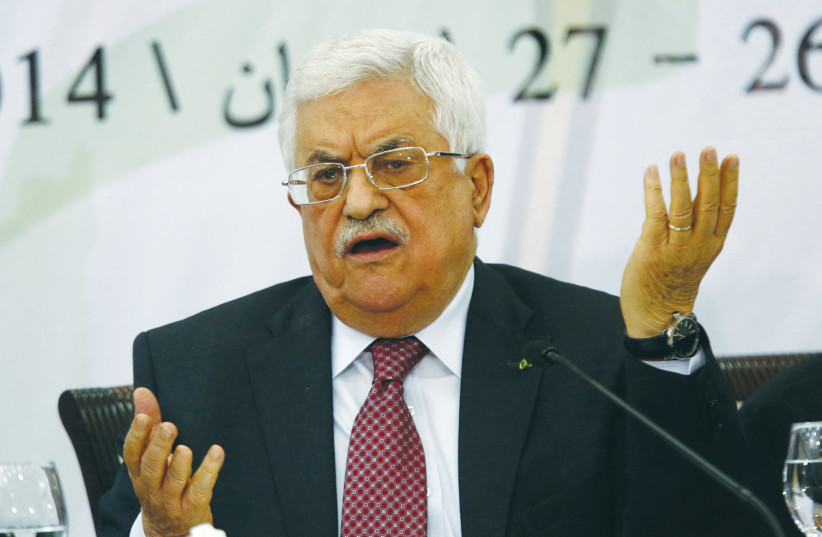In any introductory course on negotiation, the professor warns his students not to issue hasty threats. Should the other side ignore them, you are bound to carry out the punishment you promised, otherwise you will be perceived as weak and your credibility will collapse. The 16-year Palestinian presidency of Abu Mazen (Mahmoud Abbas) suggests that he skipped that class.
On quite a few occasions, I listened to Abu Mazen as he charted the intricate plan he would enact in response to Israel’s refusal to move forward with a two-state solution. He used to map out a hierarchy of steps to be implemented one by one: appealing to international law institutions, ending security coordination, revoking recognition of Israel, and, finally, dismantling the Palestinian Authority.
Abu Mazen described the culminating move with passionate intensity: he would appear at the prime minister’s residence in Jerusalem, hand over the keys to the Palestinian Authority and solemnly declare: “The PA no longer exists. It was meant to be a temporary instrument on the way to a two-state solution, but Israel has proven that it is not interested in peace, only in continuing to plunder more and more of our land to accommodate Israeli settlers. From now on, Mr. Netanyahu, the responsibility falls to Israel as the occupying power. This is what international law says. Now you deal with our criminals and our sewage.”
So what will happen next? Abu Mazen is toying with a number of scenarios. In his last speech at the UN General Assembly, he raised two possibilities. The first, to demand that the international community impose borders according to the 1947 partition resolution (a threat he repeated recently). The second, to demand equal political rights for the Palestinians within the framework of one state that extends from the sea to the river. While the first option can be written off as just another fantasy in Abu Mazen’s repertoire of threats, the second option is realistic and would endanger the existence of Israel as a Jewish state.
Alas, Israel has become accustomed to ignoring Abu Mazen – the old man who cried wolf. But now that a real wolf with real teeth is at the door, no one is alarmed. We remain complacent. The seriousness of the threat does not depend on Abu Mazen’s determination since popular support for the single-state idea is growing among the Palestinian people. They have gradually become convinced that there is no other practical solution.

According to a recent survey (October 2021) sponsored by the Friedrich Ebert Foundation, Palestinian public support for a one-state solution is on the rise. Among West Bank Palestinians, support for a single state (30.2%) exceeds that of a two-state solution (23.6%). These findings are consistent with trends long noted in Dr. Khalil Shakaki’s research, which also shows that support for a one-state solution is particularly strong among the younger generation.
One can understand Abu Mazen’s despair. The man linked his fate to a path of peace under the rubric of a two-state solution. He opposes violence, denounces terrorism, and has even boldly declared that the agreement he is seeking will not allow him to return to Safed, his hometown.
After many years of involvement in the peace process, and more than a passing acquaintance with the main players who took part in it, I am convinced that Israel has forfeited Abu Mazen as a Palestinian partner with whom a historic agreement could have been reached. Remarks made by former president Donald Trump (in an interview with Barak Ravid) are astonishing in their directness. Trump has repeatedly said that he came to understand that Netanyahu was not interested in peace whereas a historic compromise could have been reached with Abu Mazen, but the opportunity was squandered. It is a little annoying for me to utter the words: “Trump is right,” but this time, it is indeed the truth.
The harsh reality that Abu Mazen’s commitment to the two-state formula has no Israeli partner did not change with Netanyahu’s defeat. In our absurd politics, the existence of the Bennett-Lapid government is conditioned on ignoring the Palestinian hand outstretched for peace.
Abu Mazen’s reign is coming to an end. He will vacate his seat as a bitter man who gambled in vain on Israel’s commitment to a historic compromise. In his frustration, he has scattered a host of empty threats. But one sentence in his speech at the UN General Assembly is far from trivial and must trouble us all: “If the Israeli occupation authorities continue to entrench the reality of one apartheid state as is happening today, our Palestinian people and the entire world will not tolerate such a situation, and circumstances on the ground will inevitably impose equal and full political rights for all on the land of historical Palestine, within one state.”
The Israeli government offers no alternative to Abu Mazen’s binational state script. The possibility of dividing the land between the two peoples is becoming nonviable. As a result, the Jewish character of the State of Israel is increasingly imperiled. In the long run, even the most loyal friends of Israel will not accept a reality in which the price of preserving “Jewish Israel” is the destruction of “democratic Israel.”
Just as the apartheid regime in South Africa collapsed under international pressure, so too will Israel be forced to grant equal political rights to all who live in the territory under its rule. Without an Israeli peace initiative aimed at dividing the land into two states, we are abandoning Israel’s future to a Palestinian decision. The change in the Palestinian demand, from the two-state solution to the one-state solution, is in their hands. As Abu Mazen contented himself with threats, we must assume that his successors will turn to deeds.
The writer is a senior fellow at The Jewish People Policy Institute, a former director-general of the Foreign Ministry, and author of Shimon Peres: An Insider’s Account of the Man and the Struggle for a New Middle East.
